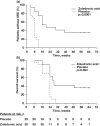Bone-modifying agents in the treatment of bone metastases in patients with advanced genitourinary malignancies: a focus on zoledronic acid
- PMID: 22496711
- PMCID: PMC3317544
- DOI: 10.1177/1756287212441234
Bone-modifying agents in the treatment of bone metastases in patients with advanced genitourinary malignancies: a focus on zoledronic acid
Abstract
Many patients with advanced genitourinary malignancies develop bone metastases, which can lead to potentially debilitating skeletal complications. Moreover, age-related bone loss and cancer treatments such as hormonal therapy for prostate cancer can weaken bone, placing patients at risk for osteoporotic fractures in addition to skeletal-related events (SREs) from bone metastases. Zoledronic acid, a bisphosphonate, is approved worldwide to reduce the risk of SREs in patients with bone metastases from solid tumors or bone lesions from multiple myeloma. Zoledronic acid, although underutilized in genitourinary malignancies, has long been the mainstay of treatment in patients with bone metastases, and can also help preserve bone during anticancer therapy. Recently, denosumab, a monoclonal antibody directed against the receptor activator of nuclear factor kappa-B ligand, was approved in the United States and the European Union for reducing the risk of SREs in patients with bone metastases from solid tumors. Denosumab (at a lower dose) is also approved in the European Union and the United States to treat androgen deprivation-induced bone loss in men with prostate cancer. In addition, preclinical rationale and emerging clinical data suggest that bone-modifying agents may be able to delay disease progression in genitourinary cancers, just as newly developed anticancer treatments have produced reductions in SREs, possibly by indirect effects on the disease course. This review article summarizes current data and ongoing studies to preserve bone health in patients with advanced genitourinary cancers.
Keywords: bisphosphonate; bone metastases; genitourinary cancer; prostate cancer; zoledronic acid.
Conflict of interest statement
Dr Aapro has conducted studies and is a consultant on bone-modifying agents for Amgen, Bayer-Schering, Novartis, and Roche. Dr Saad has served as an advisor and conducted research for Novartis and Amgen.
Figures




References
-
- Aapro M., Abrahamsson P.A., Body J.J., Coleman R.E., Colomer R., Costa L., et al. (2008) Guidance on the use of bisphosphonates in solid tumours: recommendations of an international expert panel. Ann Oncol 19: 420–432 - PubMed
-
- Aapro M., Launay-Vacher V. (2011) Importance of monitoring renal function in patients with cancer. Cancer Treat Rev [Epub ahead of print]. - PubMed
-
- Abrahamsson P.A., Ostri P., Andersen M., Kruger Hagen E. (2008) Nordic observational study evaluating safety and analgesic consumption in patients with advanced cancer under zoledronic acid (ZOMETA®) treatment: NOSAZ—interim analysis. Poster session presented at: 23rd Annual EAU Congress, 26–29 March 2008, Milan, Italy Abstract 645
-
- Amgen Europe B.V (2010) Prolia [summary of product characteristics]. Amgen Europe B.V.: Breda, The Netherlands
-
- Amgen Inc (2010) Xgeva (denosumab) injection [package insert]. Available at: http://www.accessdata.fda.gov/drugsatfda_docs/label/2010/125320s007lbl.pdf Amgen Inc.: Thousand Oaks, CA
LinkOut - more resources
Full Text Sources

